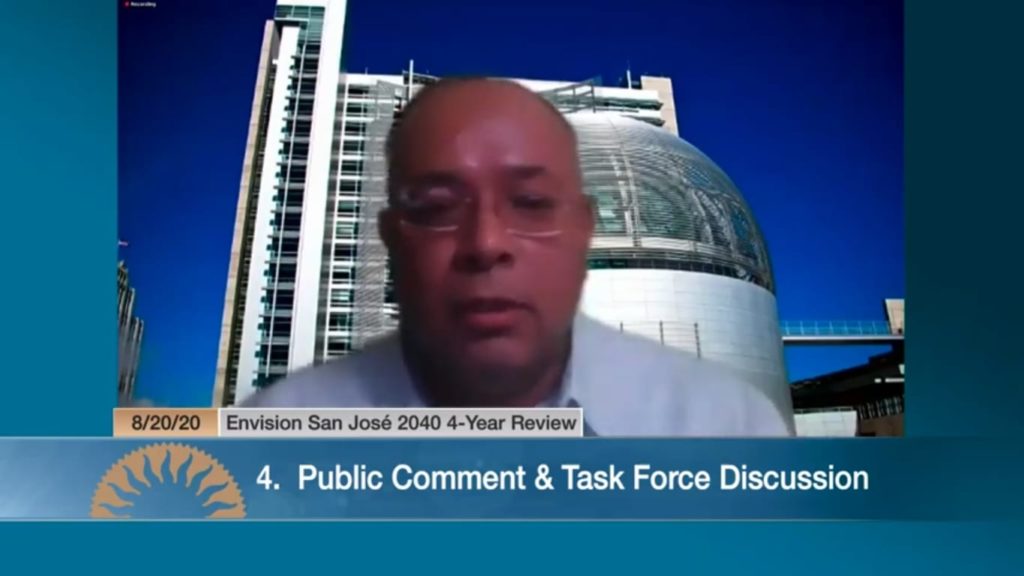San Jose took the first step to approve “opportunity housing,” an initiative to increase housing density in single-family neighborhoods — and it could be enacted citywide.
“We are voting to explore a process,” said task force member Juan Estrada, who called the motion that was voted on hours later. “We can do better to undo historic patterns that reinforce segregation.”
The city’s General Plan Task Force voted 22-12 on Aug. 20 in favor of recommending the City Council study the topic over the next two years. Opportunity housing would allow property owners to build up to four new units on a single-family home site near transit hubs, though the task force recommended exploring this citywide while prioritizing urban villages.
The idea is to increase San Jose’s housing stock by allowing multi-units and more density in single-family neighborhoods — which comprise some 94% of the city’s residential land — to chip away at Silicon Valley’s crippling housing crisis.
Estrada said restricting the new homes to areas near transit would unfairly concentrate the impacts in specific neighborhoods.
“Limiting opportunity housing to only some areas… is not really an acceptable alternative,” Estrada said. “It’s citywide or not at all.”

Task force members Roberta Moore, Harvey Darnell, Shawn Milligan, Bob Levy, Bonnie Mace, Jim Zito, Pat Saucedo, Eddie Truong, Michelle Yesney and David Pandori voted against Estrada’s motion. San Jose Councilmembers Dev Davis and Pam Foley, who serve on the task force, also opposed.
Councilmember Sylvia Arenas, a task force member who seconded Estrada’s motion, reminded meeting attendees that the task force is simply voting on a recommendation. The City Council is expected to take up the issue in the spring.
“There are no permanent recommendations that are going to be implemented anytime soon,” Arenas said. “I don’t know that this is the last bite of the apple.”
Nearly 40 people spoke during the meeting — some opposing the measure on the grounds that it would destroy the character of single-family neighborhoods, while others expressed support for adding sorely needed housing in a city where land is expensive and scarce.
Susan Wisner Phillips said upzoning single family neighborhoods, in combination with the city’s existing law related to granny units, would enable up to seven homes to be built on a single parcel of land.
“If any person on the City Council is a developer or a real estate developer, they should be recused from any voting,” Wisner Phillips said.
Kathryn Matheson said she was concerned about the loss in home value that homeowners would endure. “It will be a very costly financial loss for the neighbors of opportunity housing, as the neighbors’ property values will go down,” Matheson said.
However, Adia Hoag, who spoke in support of the measure, said there’s a duplex in her neighborhood and it didn’t diminish nearby home values.
“Anybody who opposes this, in my mind, is a racist and a classist,” Hoag said.
Jarrod Jenkins, a resident of Communications Hill, said he enjoys the mix of housing types in his neighborhood. Jenkins also said some of the arguments made against greater housing density were the same as those made against racially integrating all-white neighborhoods.
Task force member Kevin Zwick supported Estrada’s motion, saying that land use planners’ big mistake was reserving so much land for single-family homes.
“It’s uncomfortable to talk about, but the historical reasons for why is because it’s exclusionary,” Zwick said. “We have to put to bed this idea that single-family neighborhoods are sacrosanct.”
Task force member Jim Zito said the new homes built under opportunity housing should be affordable, and the city should not encourage homeowners to sell their homes to developers.
“We need to see what the intended and unintended consequences are,” Zito said.
Other task force members, including Harvey Darnell, said the policy would create a developer-fueled bidding war for single-family homes in the city, making it harder for people of color to buy homes.
City officials will consider protections for renters of single-family homes by excluding properties that have been occupied by renters in recent years from qualifying for opportunity housing. Staff will also consider whether to prohibit using the new units created under the plan for short-term rentals, such as Airbnbs.
Task force member Roberta Moore expressed concerns that the exclusion of rentals would negatively impact minority homeowners.

“This is going to be more anti-people of color,” Moore said, holding up a copy of Richard Rothstein’s The Color of Law. “I think you’ll find that you’re excluding people of race from participating in opportunity housing by voting for this.”
If the task force’s recommendations are approved by the City Council, it will take city officials about two years to conduct a displacement risk analysis, community outreach and draft an ordinance rezoning single-family neighborhoods.
The task force first discussed opportunity housing at last month’s task force meeting. During that meeting, Pandori, who is the task force’s co-chair, attempted to delay a vote on the topic, raising questions about his conduct and sparking a political showdown with fellow co-chair Teresa Alvarado, according to records obtained by San José Spotlight.
Pandori claimed city officials failed to talk to neighborhoods about the policy before the meeting.
The task force’s next meeting is on Sept. 21. The topic of that meeting has not yet been set, but remaining topics include Coyote Valley, Evergreen-East Hills development and transportation policies.
Contact Sonya Herrera at [email protected] or follow @SMHsoftware on Twitter.



Leave a Reply
You must be logged in to post a comment.